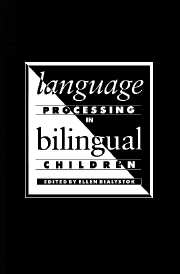Book contents
- Frontmatter
- Contents
- List of figures
- List of tables
- List of contributors
- Preface
- Introduction
- 1 Language modules and bilingual processing
- 2 Phonological processing in two languages
- 3 Second-language learning in children: a model of language learning in social context
- 4 Interdependence of first- and second-language proficiency in bilingual children
- 5 Giving formal definitions: a linguistic or metalinguistic skill?
- 6 Metalinguistic dimensions of bilingual language proficiency
- 7 Translation skill and metalinguistic awareness in bilinguals
- 8 Towards an explanatory model of the interaction between bilingualism and cognitive development
- 9 Constructive processes in bilingualism and their cognitive growth effects
- 10 Language, cognition, and education of bilingual children
- Index
9 - Constructive processes in bilingualism and their cognitive growth effects
Published online by Cambridge University Press: 11 January 2010
- Frontmatter
- Contents
- List of figures
- List of tables
- List of contributors
- Preface
- Introduction
- 1 Language modules and bilingual processing
- 2 Phonological processing in two languages
- 3 Second-language learning in children: a model of language learning in social context
- 4 Interdependence of first- and second-language proficiency in bilingual children
- 5 Giving formal definitions: a linguistic or metalinguistic skill?
- 6 Metalinguistic dimensions of bilingual language proficiency
- 7 Translation skill and metalinguistic awareness in bilinguals
- 8 Towards an explanatory model of the interaction between bilingualism and cognitive development
- 9 Constructive processes in bilingualism and their cognitive growth effects
- 10 Language, cognition, and education of bilingual children
- Index
Summary
The research literature on childhood bilingualism provides a rich data base for examining relations between language and cognition. Classic developmental theory in psychology addresses the interplay between language and cognition in the process of development, but tends to place the emphasis on one versus the other. Piaget (Piaget & Inhelder, 1969), for example, collapses language into logic (or conceptualization); by contrast, Vygotsky and his followers (Luria, 1961, 1976; Vygotsky, 1962, 1978) collapse logic into language. In the current chapter, I use constructs from dialectical-constructivist theory — a neo-Piagetian theory (Pascual-Leone, 1976a, 1984, 1987; Pascual-Leone & Goodman, 1979) — to attempt to define the nature of linguistic and cognitive structure and the processes through which they may interact in the bilingual child. I use these constructs to organize findings in the literature on cognitive effects of bilingualism, and I present new data on metaphor interpretation in bilingual and monolingual children.
Let us consider first the sorts of knowledge structures the child may construct in the course of experience — sorts that often are organized into knowledge layers or levels of representation. Three sorts are of particular interest here (Pascual-Leone, 1976a, 1984). First are structures that, after Piaget (Piaget & Inhelder, 1967), I will call infralogical.
- Type
- Chapter
- Information
- Language Processing in Bilingual Children , pp. 193 - 221Publisher: Cambridge University PressPrint publication year: 1991
- 11
- Cited by



